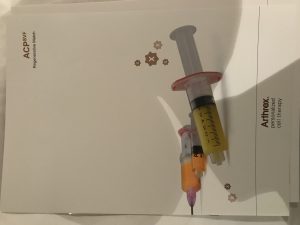It comes as a surprise to many individuals experiencing hair loss that they could have hair loss despite normal blood tests. “I’ve had every test under the book and it all comes back normal- how can this be?”
Blood tests are important to perform in any patient with hair loss. Iron levels, thyroid abnormalities, hormonal abnormalities are all important to screen. Although abnormalities may be found, many patients have normal blood tests. And even when an abnormality is found – it does not always mean it is directly implicated in the patient’s hair loss. Examples of the later include a slightly low vitamin D level or borderline ferritin reading.
The reason blood tests do not highlight the cause of the hair loss in many patients is that an abnormality in the blood may not be the actual cause of patient’s hair loss. The abnormality lies in the scalp itself – and only a clinical examination can reveal the cause. Patients with many types of hair loss consider frequently have normal blood test results.
Some patients remain surprised that their blood tests are normal. Some have the tests repeated. Some have even more blood tests drawn. Some search for other testing to have done – perhaps a hair mineral analysis.
Further blood tests may reveal an abnormality. The problem however is that the tests that were ordered frequently have no bearing on the hair loss. Hair mineral analyses nearly always turn up some abnormality – its just that these tests are unreliable and frequently have no direct utility to hair loss.
Blood Tests and Androgenetic Alopecia (AGA)
Blood tests should typically be ordered in patients with suspected androgenetic alopecia. Testing for blood hemoglobin levels, iron, thyroid, B12, vitamin D should at least be considered in all patients. Hormone levels as well as other tests may also be considered but this is not appropriate in all patients. But many patients have normal results. However, one needs to keep in mind that results are frequently normal in patients with androgenetic alopecia. Abnormalities in iron levels, zinc and thyroid should be corrected but such corrections do not always directly impact the hair loss. There is some evidence that correcting iron levels in patients with AGA on some types of treatments actually allows the treatments to work better.
Patients are often surprised that their hormone levels came back normal despite a diagnosis of androgenetic alopecia. 80-85 % of women with AGA have normal blood tests. Women with genetic hair loss who have irregular periods, acne, and increased hair on the face especially require hormone testing. However, even these patients have normal blood test results.
Blood Tests and Alopecia Areata (AA)
Testing for blood hemoglobin levels, iron, thyroid, B12, vitamin D should at least be considered in all patients with alopecia areata. Up to 10 -15 % of patient’s have thyroid abnormalities. Other tests may be important too – depending on the patient’s history. But many patients have normal results.
Blood Tests in Scarring (Cicatricial) Alopecia Areata
Testing for blood hemoglobin levels, iron, thyroid, B12, vitamin D should at least be considered in all patients with scarring alopecia. For some scarring alopecias such as lichen planopilaris, it’s clear that the risk of thyroid disease is much higher than seen in the general population. Other tests may be important too – including ANA, zinc, ESR, B12, ENA but the exact tests to order depends on the patient’s history. But many patients with scarring alopecia have normal results.
Blood Tests in Telogen Effluvium
When it comes to telogen effluvium, there are hundreds of tests that can be ordered. A few “screening” tests are important for everyone with suspected telogen effluvium but the remainder of the tests to order depends on the patient’s history. Screening tests often include blood hemoglobin levels, iron, thyroid testing, B12, vitamin D, and zinc levels. Numerous other tests are also possible depending on the patient’s story including ANA, ENA, ESR, creatinine, AST, ALT, bilurubin, CRP, VDRL/RPA, Hepatitis screening, HIV, rheumatoid factor, urinalysis, free and total testosterone, DHEAS, AM cortisol, prolactin, etc, etc
Despite all the tests, many patients with telogen effluvium also have normal results.
Conclusion
One need not feel confused if their blood tests and Alopecia areata return back normal. This is common in patients with many types of hair loss. One should also not be confused if they work hard to correct an abnormality (like low iron) and find their hair has not improved. Hair loss is more complicated that this. The factory that produces hair lies in the scalp – not in the blood. We have limited tools in the present day to properly assess the inner workings of the tiny hair follicle and so now blood tests and other similar tests are the best we have.
Source: Donavan medical
